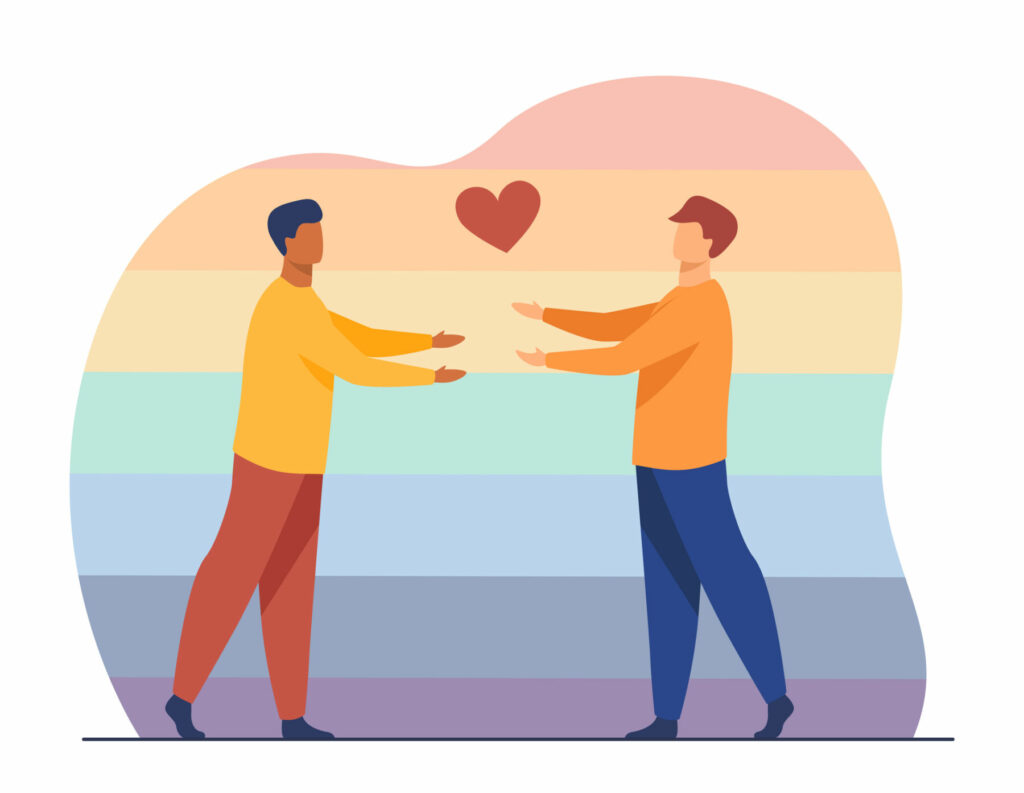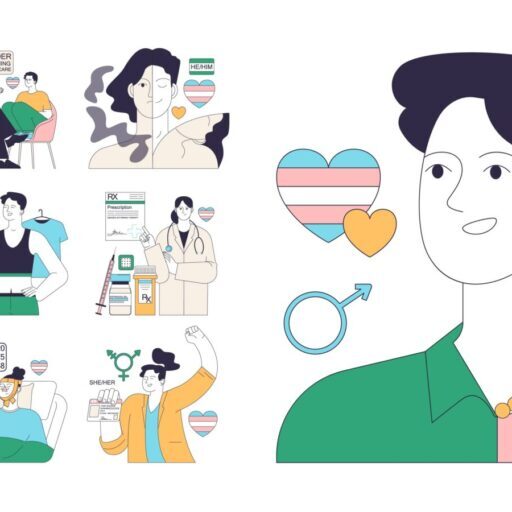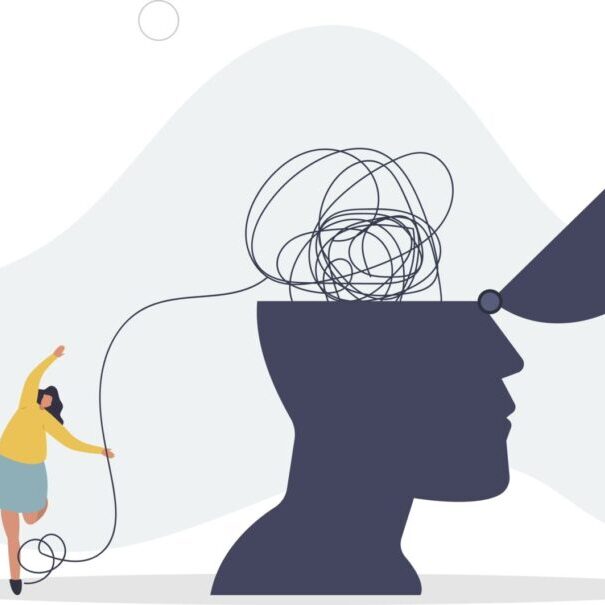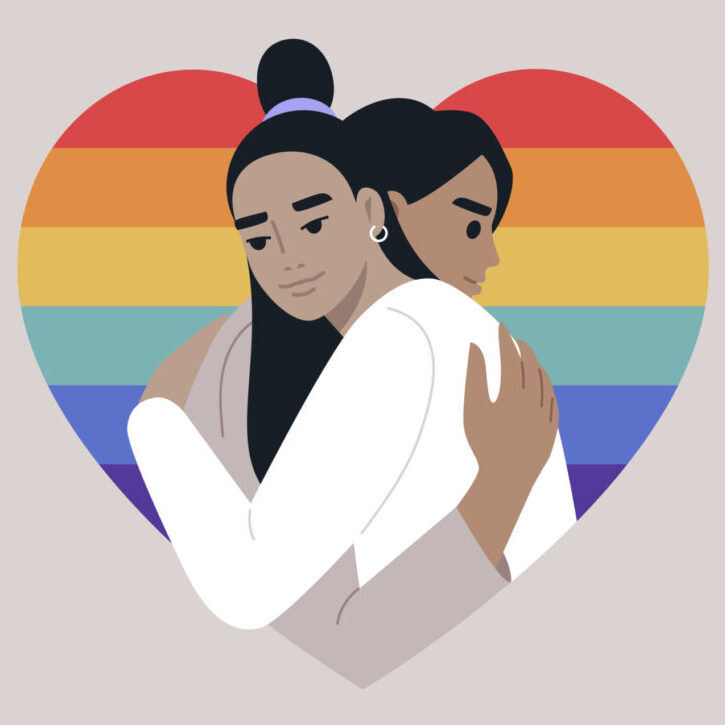Challenging Monogamy-Shaming Among Gay Men

Some healthy gay men want monogamy. That’s right – some healthy relationships between gay men are monogamous. For some, this might sound surprising, which highlights an ingrained societal bias and a need for broader acceptance and understanding of queering monogamy.
For the sake of full transparency, our practice is sex-positive and sex celebratory. We want everyone to live satisfying and authentic lives, both non-sexually and sexually. This can often mean helping people explore the bounds of their sexuality and navigate healthy sexual agreements within relationships.
Many of our other articles discuss establishing healthy non-monogamous relationships. The bottom line is that monogamous and non-monogamous relationship agreements can both be healthy!
When discussing relationships within the gay community, monogamy often doesn’t come up as the first, most prominent example. The prevalent stereotype is that gay men are more likely to engage in non-monogamous relationships. Let’s explore where these beliefs come from and the tendency to overlook or even judge monogamous relationships among gay men.
Inherent to Queerness Is Not Defaulting to Norms
Queerness, by its very nature, resists fitting into predefined molds, especially those dictated by heteronormativity. To understand this resistance, it is essential first to define heteronormativity and its implications. Heteronormativity is the assumption that heterosexuality, with its traditional gender roles and expectations, is the default or normal mode of sexual orientation and relationship structure.
It positions heterosexual relationships, particularly monogamous ones, as the ideal standard to which all should aspire. This cultural norm perpetuates the idea that monogamy is inherently superior and more virtuous, marginalizing those who do not conform to this standard.
Further, heteronormativity reinforces a binary understanding of gender and sexuality, promoting the idea that there are specific roles and behaviors appropriate for men and women and that heterosexual relationships are the natural and preferred form of partnership.
This ideology permeates many aspects of society, from media representations to legal definitions of family. It creates a flawed framework within which deviations from the norm – such as same-sex relationships, polyamory, or even unconventional heterosexual relationships – are viewed as inferior or deviant.
Queerness and Resistance
Queerness challenges these conventions, embracing a spectrum of identities and relationships that defy traditional norms. This resistance includes how relationships are structured, often rejecting the notion that monogamy is the only valid or desirable form of partnership.
For many within the queer and LGBTQ+ community, forming relationships that do not adhere to heteronormative expectations is a form of resistance and self-affirmation. However, this resistance can sometimes lead to an oversimplified rejection of all things perceived as heteronormative, including monogamy.
Monogamy as a Heteronormative Expectation
Monogamy is frequently viewed as a heteronormative expectation imposed rather than chosen. This perception can lead to the erroneous belief that monogamy is incompatible with queerness. However, for many gay men, monogamy is a conscious and fulfilling choice that aligns with their values and desires.
Choosing monogamy does not necessarily mean conforming to heteronormative standards; rather, it can be a deliberate decision to pursue a relationship structure that feels right for the individuals involved. Just as celebrating and honoring non-monogamous relationships is crucial to queer advocacy, so is recognizing and respecting the choice for monogamy.
Gay Men Who Choose Monogamy Are Often Judged or Subject to Myths
Despite the validity of monogamous relationships among gay men, those who choose this path often face judgment and misconceptions. These misconceptions can create a hostile environment where monogamous gay men feel marginalized within their community. Some common myths about gay monogamy include:
- They’re trite – Monogamous relationships are often dismissed as conventional or unoriginal. This myth suggests that by choosing monogamy, gay men are simply replicating heterosexual norms without critical thought.
- They’re boring – There’s a stereotype that monogamous relationships lack excitement and lead to a dull and unsatisfying sex life. This perception undermines the dynamic and fulfilling nature of many monogamous relationships.
- They’re less than – Some believe there’s a hierarchy where non-monogamous relationships are seen as more evolved or liberated, which is untrue. Monogamous and non-monogamous relationship agreements can be healthy. The health of a relationship is not determined by its structure but by its respect, communication, and commitment.
- They’re adventureless – The assumption that monogamous gay men are not adventurous or open-minded. This myth fails to recognize that adventure and exploration can occur within a monogamous context.
- They’re conforming and inauthentic – The belief that choosing monogamy is conforming to heteronormative standards. This overlooks the fact that many gay men choose monogamy as a conscious, authentic expression of their desires. These authentic desires may align with hetero norms, but can still be authentic. This perspective denies the diversity and individuality within the queer community.
- They’re based on insecurity – The myth that monogamous gay men are insecure or possessive. This stereotype ignores the trust and confidence that underpin many monogamous relationships.
Historical Trauma and Judgment
The judgment towards gay men who choose monogamy can be traced to historical trauma. For decades, gay men have had to “queer” their relationships, defying conventional norms to gain acceptance and validation. This history of resistance has created a strong sense of identity and community, built on the rejection of heteronormative standards.
Consequently, relationships that align more closely with heteronormative conventions can be seen as a threat to the progress and identity forged through years of resistance. This dynamic can create tension and judgment within the queer community, as some view monogamous relationships as a step backward rather than a valid and personal choice.
Potential Negative Mental Health Outcomes
The assumption that gay men cannot or should not be in monogamous relationships can have significant mental health implications. These assumptions often undermine an individual’s sense of self and their relationship, leading to a range of psychological challenges.
One major issue is the doubt that can arise about one’s desires and needs. Gay men may find themselves questioning whether they truly want a monogamous relationship or if their preference is somehow wrong or less valid. This internal conflict creates a significant amount of stress and confusion, as individuals struggle to reconcile their authentic desires with the judgment they face.
This doubt often leads to insecurity, especially in the context of dating and forming new relationships. Insecure individuals may find it challenging to form healthy attachments and communicate their needs effectively, further complicating their romantic endeavors.
The fear of judgment can also prevent gay men from asking for the relationship structure they genuinely desire, leading them to settle for arrangements that do not align with their true preferences. This discrepancy between what they want and what they feel they can ask for often results in dissatisfaction and emotional turmoil.
Additionally, damaging assumptions about the nature and quality of their relationships can erode trust and satisfaction. When gay men in monogamous relationships feel that their partnership is viewed as inferior or problematic, it can lead to feelings of inadequacy and frustration.
These feelings, in turn, can contribute to lower self-esteem. Constant questioning and doubt chip away at an individual’s sense of self-worth, making them feel unworthy or incapable of maintaining a fulfilling relationship.
The pressure to conform to community expectations and the fear of being judged or misunderstood can also be overwhelming and isolating. As these mental health issues compound, they can significantly impact the overall well-being and quality of life of those affected.
Another unfortunate example of minority stress that, when experienced with other minority stresses, cumulatively leads to higher rates of depression and anxiety among queer people than their nonqueer counterparts.
Tips for Health within Monogamy
Recognize Positive Elements of Non-Monogamy
Even within monogamous relationships, it is possible to appreciate aspects of non-monogamous structures without desiring to adopt them. This recognition can help monogamous couples understand and respect the choices of others while affirming their own decisions. Within the queer community, we can’t both expect others to support our relationship structures and not support theirs.
Value of External Connections
Recognizing the value of meeting and forming connections with people outside the primary relationship can enrich one’s social life and personal growth. These connections can provide diverse perspectives and experiences that enhance personal development.
Build Novelty and Excitement
Monogamous partners can acknowledge the allure of potential alternative sexual acts and roles, appreciating the novelty and excitement that comes with new experiences, even if they choose not to pursue them. Understanding and discussing these desires can strengthen the intimacy and trust within the relationship.
Adhere to Relationship Fundamentals
No matter the relationship structure that’s most right for you, the fundamentals of healthy relationships persist. These involve open communication, mutual respect, and a commitment to understanding and meeting each other’s needs.
Resolve Resentments
Resentment can arise in any relationship and can lead to less sexual intimacy. Addressing this issue involves recognizing and discussing feelings of resentment before they escalate. One effective strategy is regular “state of the union” conversations, where partners discuss their relationship openly and honestly, addressing any concerns or issues that may arise.
Validate Regularly
Both self-validation and validating your partner are crucial. Regularly affirming each other’s values and contributions to the relationship can help maintain a healthy dynamic. Validation fosters a sense of security and appreciation, which is essential for a satisfying and enduring partnership.
Talk about Sex
Open communication about sex is vital. Discussing desires, boundaries, and preferences can enhance sexual satisfaction and prevent misunderstandings. Encouraging open dialogue about sexual needs and experiences helps build a deeper connection and ensures that both partners feel heard and respected. Plus, the discussion alone can be hot.
Challenging monogamy-shaming among gay men involves recognizing and dispelling myths, understanding the impact of historical trauma, and fostering acceptance of diverse relationship choices.
By embracing the validity of monogamous relationships within the gay community and the larger queer community, we can create a more inclusive and supportive environment. If you’d like more support in navigating these dynamics, the LGBT affirming therapists at Tandem Psychology are ready to help!
This blog is made for informational and educational purposes only. It is not medical advice. The information in this blog is not intended to (1) replace a one-on-one relationship with a qualified licensed health care provider, (2) create or establish a provider-patient relationship, or (3) create a duty for us to follow up with you.



